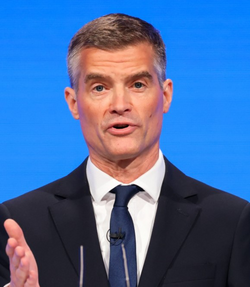Prime Minister of Hapatmitas
| Prime Minister of Hapatmitas
Prìomhaire na Hapatmitas | |
|---|---|
 | |
| Style | The Honourable (formal) Prime Minister (informal) |
| Type | Head of government |
| Residence | Government House |
| Appointer | The President of Hapatmitas, with the confidence of the National Assembly |
| Term length | 4 years (renewable) |
| Formation | 14 April 1822 1 August 1950 (current form) |
The prime minister of Hapatmitas (Cantuath: prìomhaire na Hapatmitas) is the head of government of Hapatmitas. The prime minister chairs the Council of Ministers and selects its ministers of state. The prime minister is appointed by the President, with the confidence and nomination of the National Assembly. Most prime ministers have sat in the National Assembly as they require the confidence of that house to govern, though there have been some exceptions.
The current prime minister is Doug Macintosh, taking office on 13 April 2024. Macintosh succeeded long-time serving Cormac Gilchrist.
History
Authority
The prime minister is officially the head of government. However, according to the Constitution, the president is nominally vested with executive power instead. However, the president can only exercise this power on the advice of the Council of Ministers, of which the prime minister is the head. Because of this, the prime minister de facto wields more legislative and executive power than the president. This clearly defined clause within the constitution has become a long-standing virtue of the parliamentary system installed in the country.
The prime minister is responsible for the coordination of government ministries, policies, and activities. Today, some of these duties have been delegated to the Cabinet Secretariat. The nominal decisions and appointments made by the president, such as the dissolution of the Tiomnaidh or the appointing of civil servants, are made on the advice of the prime minister. In the National Assembly, the prime minister is responsible for leading the session's business. In the case of the prime minister's absence, the next most senior minister of state is responsible for the administering of business.
Though the prime minister is the chair of the Council of Ministers, the Constitution still requires the president to appoint ministers of state. However, again, this is done on the advice of the prime minister and hence the appointment is nominal. While the president still ceremonially serves as commander-in-chief, the prime minister still has the authority to declare defence or security measures. This is possible through the prime minister's executive power within the Defence Council as co-chairman, a position also held by the president, the Chief of the Defence Staff, and the Minister of State for Defence. The prime minister may additionally act on the provisions made for the Minister of State for Defence as the chair of the Council of Ministers, though this power is not used. The prime minister is not formally provided the authority to negotiate and ratify international agreements; the president is given that authority. However, the president delegates the duty of negotiation to the Minister of State for Foreign Affairs and retains the titular authority of ratifying such agreements.
